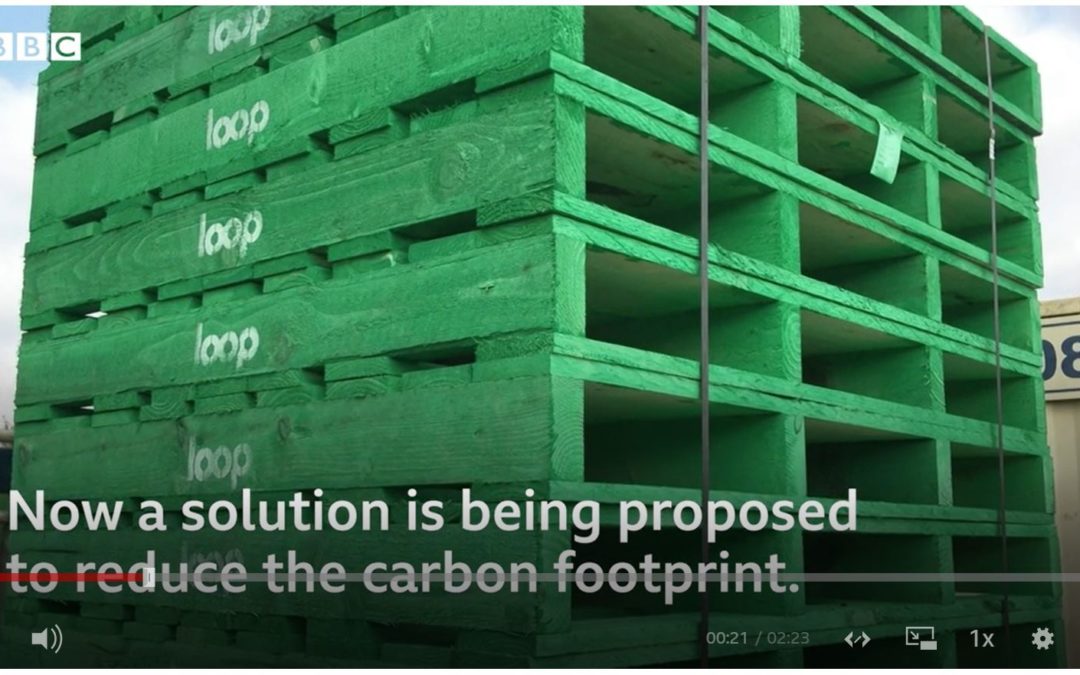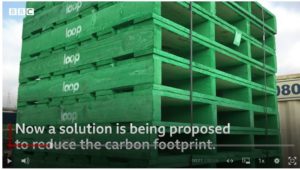
by Clair Mooney | Nov 11, 2021 | Sustainability
The construction industry is playing its part in transforming its working practices and leadership models to contribute to the global ambition for a net zero future. The Construction Leadership Council (CLC) has partnered with ITN Productions Industry News to produce ‘Building a Greener Britain’, a programme exploring some of the new pathways and sustainable methods the sector is adopting, alongside initiatives such as the Construct Zero programme, CLC’s response to the climate emergency.
Anchored by presenter Clare Nasir, Building A Greener Britain, features experts from within the construction industry along with informative interviews, news items and sponsored editorial profiles, filmed in the ITN Productions Industry News London studio and remotely on location. Brian Berry, Chief Executive of the Federation of Master Builders, joins Clare Nasir to represent the CLC Steering Coordination Group and discuss how the sector is meeting the challenge.
The feature focusses in on some of the Business Champions who are demonstrating the sector’s commitment towards reducing carbon emissions. These include
Construction company and property consultancy, Rider Levett Bucknall, is making sustainability an integral part of the conversation at the outset of projects to help achieve greener results.
At the University Hospitals of Leicester, NHS Trust, where the company is reconfiguring the estate with new construction alongside repurposing existing buildings, Andrew Reynolds, Chief Executive of Rider Levett Bucknall, talks about the role of the CLC in meeting sustainable development goals.
The Active Building Centre in Gloucester, created as part of UK Research and Innovation (UKRI) Transforming Construction Challenge, which is demonstrating how future builds can be both labour and energy efficient.
A familiar face to many in the finishes and interiors sector Mike Chaldecott, CEO, Saint-Gobain, UK & Ireland, outlines the company’s long-term sustainability strategy.The programme goes to the plant in Yorkshire where Saint-Gobain has invested £30m to produce glass using less energy with higher levels of recycling and more innovation.
Find out more about Construct Zero here
To help start or continue your net zero journey, visit the FIS Sustainabilty Hub here.

by Clair Mooney | Nov 11, 2021 | Sustainability
FIS and the Supply Chain Sustainability School are collaborating to help deliver Net Zero in the finishes and interiors sector through a new virtual training portal hosted on the Supply Chain Sustainability School website.
This sustainability training hub is another output of the FIS Sustainability Working Group, which has been established within the FIS community to support a focus on individual change, collective focus and supply chain engagement. The working group has five core objectives:
- Increasing knowledge and understanding within the supply chain
- Setting targets and standardisation (including monitoring and measuring impact)
- Providing an active network and encouraging collaboration
- Highlighting individuals and approaches that help inspire and inform change
- Informing design and encouraging better asset management
At our COP26 webinar this week, FIS Sustainability Champion Flavie Lowres introduced how the tool can be used to support training on Net Zero and wider sustainability matters in our businesses and the School’s tool for measuring the carbon impact of your business available via the Supply Chain Sustainability School’s Finishes and Interiors hub here.
You can listen again to the webinar here.

by Clair Mooney | Nov 11, 2021 | Sustainability, Technical
The Plastics Packaging Tax is due for introduction on 1 April 2022 and HMRC is looking for businesses’ views on the technical application of the regulation. The consultation closes on 1 December 2021 and details are available here.
The Primary legislation establishing the tax was included as part of the Finance Act 2021. The aim is to provide economic incentives for businesses to use recycled plastic in the manufacture of plastic packaging which will stimulate increased levels of recycling of plastic waste. This instrument sets out the detailed administrative requirements for the tax. It establishes when a plastic packaging compound is finished for the purposes of the tax and when it becomes chargeable to tax. It also details the evidence that businesses will need to keep, how to weigh packaging and determine the recycled plastic content as well as setting out the obligations with reference to the administration of the tax including registration and returns.
To view the new information visit https://www.gov.uk/government/consultations/technical-consultation-on-plastic-packaging-tax-general-regulations-2021

by Clair Mooney | Nov 11, 2021 | Sustainability
Contractors bidding for central Government contracts worth more than £5 million a year are now required to provide a Carbon Reduction Plan. Plans must be updated at least once a year and meet the standard set out in Procurement Policy Note (PPN) 06/21, which includes a template for contractors to use.
The CLC CO2nstruct Zero programme is bringing the construction supply chain together to drive carbon out of the sector. Businesses across the industry are being encouraged to align their own commitments to one or more of the nine priorities and sign up as a ‘Business Champion’.
Businesses that wish to can make a formal commitment to reaching net zero by signing up to the Carbon Reduction Code for the Built Environment. Signatories to the code commit to meeting net zero by 2045, with an interim target to reduce net direct and indirect carbon emissions by 2030, and to publishing annual reports on progress towards their goal.
FIS Members wishing to update or develop a Carbon Reduction Plan can visit the FIS Sustainability Hub for resources and ideas or contact FIS Sustainability Champion, Flavie Lowres to discuss ideas and options.

by Clair Mooney | Nov 10, 2021 | Sustainability
Legislation that will protect and enhance the environment for future generations has now passed into UK law. Through the Act, we will clean up the country’s air, restore natural habitats, increase biodiversity, reduce waste and make better use of resources.
It will halt the decline in species by 2030, require new developments to improve or create habitats for nature, and tackle deforestation overseas.
It will help transition to a more circular economy, incentivising people to recycle more, encouraging businesses to create sustainable packaging, making household recycling easier and stopping the export of polluting plastic waste to developing countries.
These changes will be driven by new legally binding environmental targets, and enforced by a new, independent Office for Environmental Protection (OEP) which will hold government and public bodies to account on their environmental obligations.
Environment Secretary George Eustice said:
The Environment Act will deliver the most ambitious environmental programme of any country on earth.
It will halt the decline of species by 2030, clean up our air and protect the health of our rivers, reform the way in which we deal with waste and tackle deforestation overseas.
We are setting an example for the rest of the world to follow.
The Environment Act includes a new legally binding target on species abundance for 2030, which will help to reverse declines of iconic British species like the hedgehog, red squirrel and water vole.
The UK will now be able to go further than ever before to clamp down on illegal deforestation and protect rainforests, through a package of measures will ensure that greater resilience, traceability and sustainability are built into the UK’s supply chains.
The Act will crack down on water companies that discharge sewage into rivers, waterways and coastlines. It will see a duty enshrined in law to ensure water companies secure a progressive reduction in the adverse impacts of discharges from storm overflows. New duties will also require the government to publish a plan to reduce sewage discharges from storm overflows by September 2022 and report to Parliament on the progress towards implementing the plan.
Emma Howard Boyd CBE, Chair of the Environment Agency, said:
We need strong laws, investment by the private sector and clear, well-funded regulation to protect the environment. Without this, we will not see the progress we all want.
The new legal targets for water in the Environment Act today will help wider efforts to tackle pollution, reduce demand for water and secure clean and plentiful water for all.
It is good to see these laws pass as we work to protect the natural world, help people to stay safe from flooding and support communities, businesses and government to make the country more resilient to climate shocks.
Work on implementing Environment Act policies is well underway. Work has begun on developing legally binding environmental targets, and consultations on the deposit return schemes for drinks containers, extended producer responsibility for packaging and consistent recycling collections have been launched, which will transform the way rubbish is dealt with.
A draft Principles Policy Statement has been published which will put protecting the environment at the heart of future policy.
The Office for Environmental Protection was set up in an interim, non-statutory form in July, providing independent oversight of the Government’s environmental progress and accelerating the foundation of the full body. The OEP will formally commence its statutory functions shortly.
The Environment Act has become law during the UK’s hosting of the COP26 summit in Glasgow, during which the UK has brought the world together to secure ambitious commitments to tackle climate change.

by Iain McIlwee | Nov 9, 2021 | Main News Feed, Sustainability
Through the FIS Sustainability Leadership Group, the trade body representing the £10 billion fit-out, finishes and interiors sector became the first trade body to sign the Pallet LOOP Charter. The charter is focussed on delivering a simple way of actively eliminating avoidable pallet waste.
The Pallet LOOP is a new venture designed to deliver a tangible step-change in the transportation of building materials throughout the UK. Through its deposit-based scheme, The Pallet LOOP will remove the need to harvest 4,500 acres of trees every year to feed current linear pallet practices. This in turn will reduce related industry CO2 emissions by up to 70% and cut construction waste by around 10%.
By signing The Pallet LOOP Charter, FIS acknowledge that now is the time for change. Currently, UK construction consumes 18 million pallets each year, achieving a reuse rate of less than 10% – significantly less than FMCG retail, where pallet reuse is now the standard. This practice is clearly unsustainable – economically and environmentally. In the finishes and interiors sector alone it is estimated that there is around 25 pallets used per £100,000 of turnover.
Supporters of the Charter commit to:
- A comprehensive evaluation of how The Pallet LOOP could be integrated within our sector.
- Championing the adoption of a circular economy pallet solution that reduces associated CO2 emissions, delivers improved safety, and increases supply chain resilience through standardisation.
- Cooperating with other industry stakeholders to accelerate sector wide implementation – conscious that there is no Planet B and that that we must act now and adopt more sustainable supply chain and distribution solutions
On signing the charter FIS CEO Iain McIlwee stated:
“The shift in gear needed to help us get where we need to be as a sector isn’t going to happen by waiting for change or trying to find a magic formula, it is about looking at what we can each individually and collectively do to make a difference now. Logistics is key to enabling change and within this a focus on eradicating single use pallets makes perfect sense. We very much hope that finding a formula here will be a catalyst for change that can accelerate collaboration and focus the supply chain on practical steps to a practical, circular economy”.
Members of the FIS community that have also signed the charter include Meronden, Willmott Dixon, BDL and Platt and Reilly.
You can find out more about Pallet LOOP via their website here or via the BBC Short featuring Pallet LOOP linked below.

Visit the FIS Sustainability Hub here







